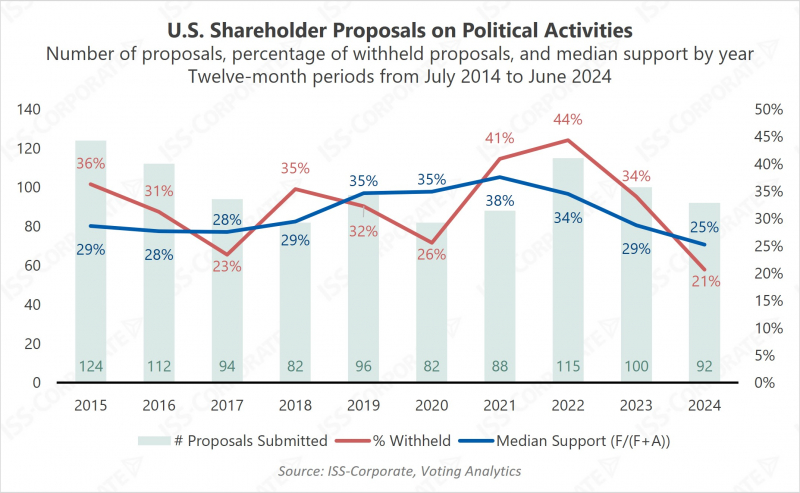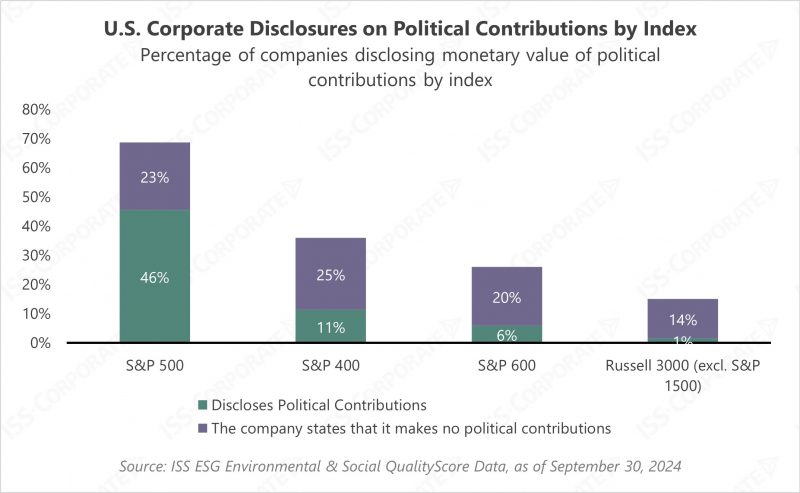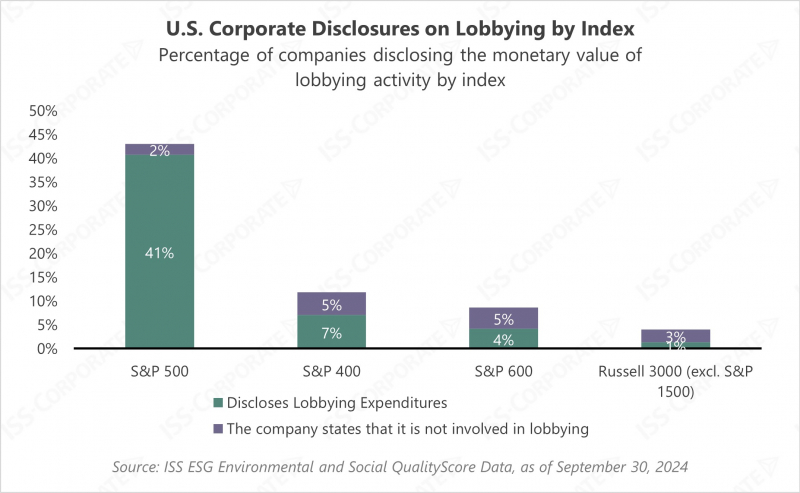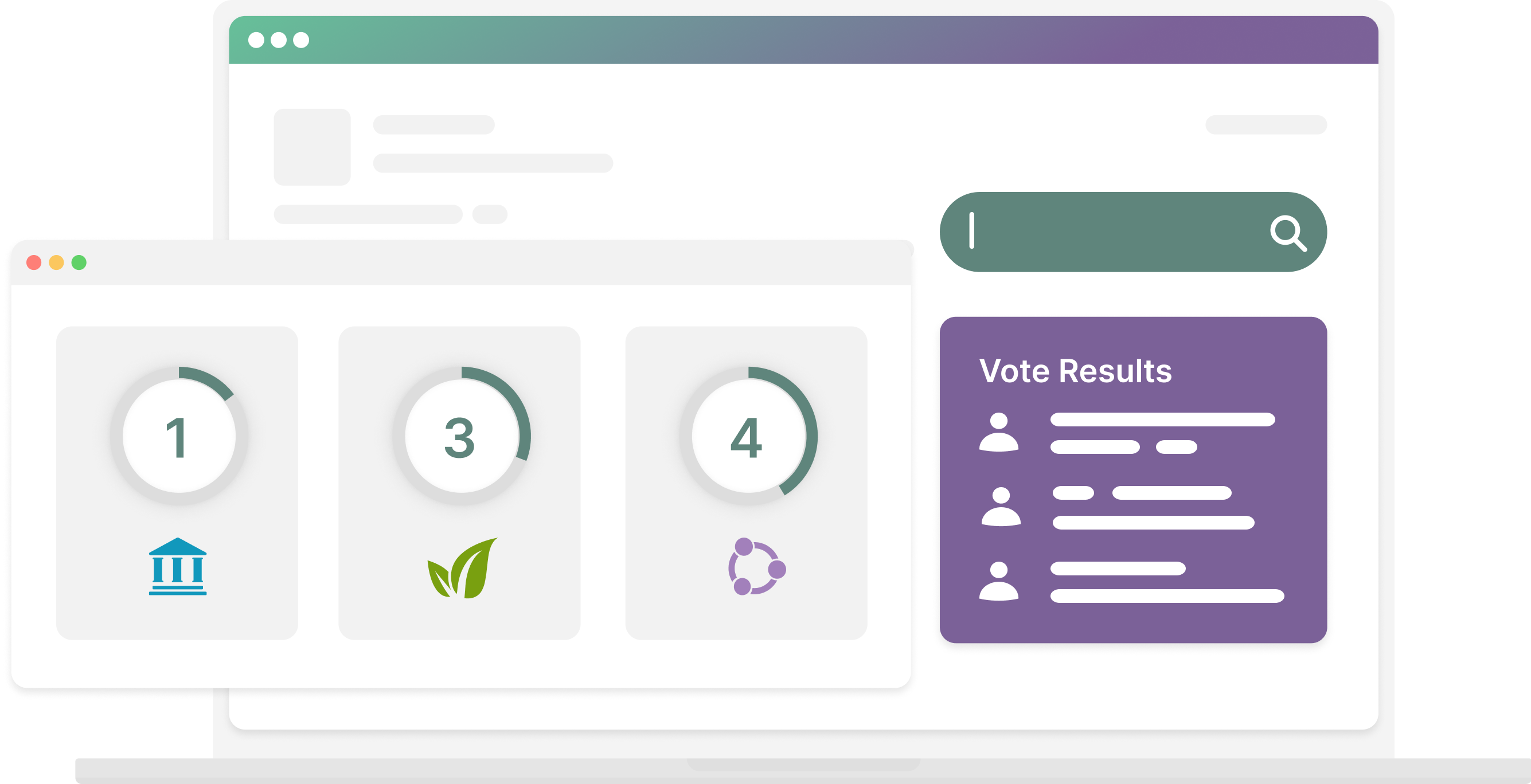Corporate Political Activity Disclosures: A Continued Priority for Investors and Companies

For much of the past two decades, transparency regarding corporate political activities has been a key issue in corporate engagements with investors. Over the past decade, shareholder proposals focused on political activity transparency have consistently ranked the highest in volume among proposals submitted at U.S. companies, outpacing all other environmental and social categories, including those related to climate change and human capital management.
As the U.S. presidential election approaches, ISS-Corporate reviewed shareholder proposals submitted to U.S. companies in the past decade, along with the latest corporate disclosure data, to assess key trends and developments in relation to engagements on this crucial topic for companies and investors.
High proposals volume, healthy support levels
The 2010 Citizens United Supreme Court decision permitted unlimited corporate and union spending in elections, classifying such activities as free speech, leading to significant changes in U.S. campaign finance dynamics. This ruling resulted in a surge of shareholder proposals in the U.S. focusing on political activity transparency, nearly doubling from 2010 (59 submitted requests) to 2012 (117). Since then, proposals seeking greater transparency in political contributions, lobbying activities, and related matters have ranked among the top issues for shareholder proponents by volume. Notably, in recent years, political activity-related proposals have gained traction among prominent individual shareholder proponents who have historically concentrated on shareholder rights issues, including John Chevedden, James McRitchie, Myra Young, and Kenneth Steiner.
Support levels for these requests have remained high, averaging approximately 30% of votes cast over the past 10 years leading to June 30, 2024. Peak support levels were observed in 2021, similar to trends seen with other shareholder proposals focusing on environmental and social topics. In the past year, however, support levels dropped to a median of 25% of votes cast. The drop in support in 2024 can be partly explained by proposal targeting and the presence of new types of requests. Some targeted companies had previously disclosed they do not make political contributions and provided sufficient transparency around management of key risks, lending less validity to shareholder proposals seeking to change their behavior. Additionally, two new types of political activity-related requests emerged in the past two years which appeared overly prescriptive: one seeking global transparency in political spending outside the U.S., and the other asking companies to require trade associations or similar groups to disclose detailed expenditure information. Both proposal types were viewed as seeking information well beyond standard practice, resulting in lower support levels. Nevertheless, requests focusing on lobbying transparency have maintained support comparable to the 2021 peak year, receiving median support of 31% of votes cast in 2024.
A significant portion of requests have been withdrawn by proponents, signaling successful engagements with proponents and potential commitments made by companies. In the period under review, approximately 33% of submitted proposals were withdrawn by proponents, with this figure reaching record highs in 2021 and 2022. In 2024, the percentage of withdrawn proposals subsided, reflecting broader market trends in proposal withdrawals.

Focus on transparency, with growing interest in congruence with company values
More than 80% of political activity-related proposals have focused on transparency regarding corporate funds used for the purposes of political contributions or lobbying, including the recipients of such payments. These proposals generally exceed mandatory disclosure requirements, which primarily cover direct contributions to candidates, political action committees (PACs), and registered lobbyists. Current regulations do not require companies to report spending on “dark money” groups – which do not disclose their donors – or contributions to trade associations or “grassroots lobbying” efforts.
In recent years, numerous proposals have called for companies to assess the alignment of their lobbying activities with stated corporate initiatives and values. As political activity disclosures have become more common due to shareholder pressure, some proponents and stakeholders have highlighted inconsistencies between companies’ public commitments on issues like climate change and human capital management and the positions of advocacy groups that these companies support. Over the past three years, such alignment-focused proposals have constituted about one-third of shareholder proposals focusing on political activities, with climate-related lobbying request gaining notable traction.

Disclosures show improvements, but gaps remain
An increasing number of companies are disclosing information about their political contributions and lobbying payments, particularly larger organizations, which are often the primary targets of shareholder campaigns. About 70% of S&P 500 companies voluntarily provide details on their political contributions or state that they do not engage in such payments. In contrast, the level of disclosure is significantly lower among mid- and small-cap companies, with fewer than a quarter of non-S&P 500 companies in the Russell 3000 providing this information.

The level of transparency regarding lobbying activities is lower, with only 43% of S&P 500 companies voluntary sharing information about their lobbying spending. This figure drops to just 6% among the companies in the Russell 3000.

Companies are working to strike a careful balance as they navigate political uncertainty and amid shifting pressures from multiple stakeholders. With increasing money flowing into election campaigns and a more partisan, contentious political environment, companies must demonstrate high levels of transparency and accountability in their political involvement to protect their reputation and manage key risks more effectively.
New Approach to SEC Rule 14a-8: What It Means for Companies
Governance, Risk & Resilience: Key Takeaways from London
Overstaying Their Welcome? A Close Look at Independent Directors Tenure in Hong Kong
Too Many Hats: Hong Kong Companies Pressed to Cut Down on “Overboarding”
FTSE 350: Board, Committee Chair Shareholder Support Can Signal Governance Concerns
2025 U.S. Proxy Season: Midseason Review Finds Sharp Drop in Shareholder Resolutions on Ballot
DExit: Signs of Discontent in Biggest Corporate Domicile?
The Evolving Landscape of Workplace Mental Health Management
Corporate Political Activity Disclosures: A Continued Priority for Investors and Companies
Governance QualityScore as an Indicator of Risk and Investor Sentiment

